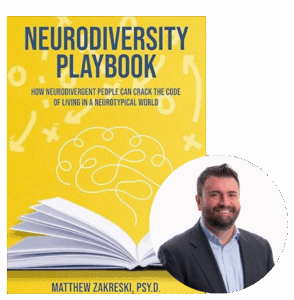Neurodiversity Playbook: How Neurodivergent People Can Crack the Code of Living in a Neurotypical World
September 25-November 6, 2025
Participate in real time or anytime, your choice!
What if the key to unlocking a gifted student’s full potential lies not in fixing their challenges, but in embracing their differences? The Neurodiversity Playbook offers a powerful shift in perspective—one that can transform how we teach, support, and inspire twice-exceptional learners. This four-part book study designed for educators working with gifted students will guide participants through key concepts of neurodiversity, with a focus on practical strategies to support twice-exceptional learners. Each session will delve into ways to recognize diverse cognitive profiles, create inclusive learning environments, and implement strengths-based approaches. By the end of the study, educators will be equipped with tools to better understand, engage, and empower neurodiverse gifted students in their classrooms. Engage in the learning on your schedule, in live sessions with the author or view the recordings at your own pace anytime.
About the Author
Matthew “Dr. Matt” Zakreski, PsyD is a high energy, creative clinical psychologist and professional speaker who utilizes an eclectic approach to meet the specific needs of his neurodivergent clients. He is the co-founder of The Neurodiversity Collective, LLC, co-host of the podcast “Nerding out on Neurodiversity,” and the author of the Neurodiversity Playbook: How Neurodivergent People Can Crack the Code of Living in a Neurotypical World.
TAGT Members | $299 |
Non-Members | $399 |
Book is included with registration.

Meeting Dates:
- September 25, 3:30-5:00 pm
- October 9, 3:30-5:00 pm
- October 23, 3:30-5:00 pm
- November 6, 3:30-5:00 pm
Module 1: What is Neurodivergence and What Does It Mean?
Readings: Chapters 3 and 4
Module 2: Emotions and Regulation
Readings: Chapters 2 and 6
Module 3: Social Skills and Surviving Others
Readings: Chapters 8, 9, and 10
Module 4: Navigating Hope and Failure
Readings: Chapters 11 and 12
